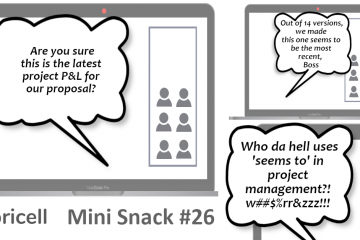
The Fear
I recently participated in a forum discussion like this.
Question:
'What is the best estimation method for Agile?'
Many answers:
‘I prefer not to estimate. If I only can avoid it!’
While the question itself is a typical education request from a less experienced person, the answers we provided by many experienced forum users.
And replies raised my attention but rather the question. And the fact it was pretty many similar answers.
There must be some fear to provide estimations. I thought.
The Role of Estimation
My strong opinion is that project estimation is a necessary component of any project.
Without them, no one can really plan anything. Right?
But estimations can play many different roles. Therefore, the level of responsibility varies as well. That could drive fear.
The scenario from that forum question was about estimating an agile project. In fact, it referred to a typical spring planning exercise.
We all know this is quite substantial activity on a sprint.
There are several technics available from more sophisticated like Story Points up to simplistic methods like T-Shirts. We will not discuss in detail the options available.
I can still imagine a project where the team has the comfort of not providing estimations – and they are not pushed for this.
That could be a project with a very small backlog or insignificant project value from the portfolio. But this would be a rare situation.
Estimation on agile projects represents a very low risk.
Simply because you operate a small scope. Also coming to estimate is a team output, rather than one person. Responsibility is shared.
Also, springs is a learning curve, and rather sooner than the later team will get confidence and comfort of providing estimates using one of many methodologies.
"Project estimations are a necessary component of any project.
Without them, no one can really plan anything "
But let's say we are in a company providing projects commercially to its customers and we need to propose it on fixed scope fixed price base.
In this case estimation of the project is a different impact:
It possibly is a major input for the final price
Because above, there is probably a budget limit cap as well which is a big assumption for estimation.
It probably covers a much bigger scope than a simple sprint – some estimations can refer to multimillion USD value scope.
There may be many components that are new to experts preparing estimations.
We can go on and on…
Summarizing any mistake may cost a vast amount of money here.
In this case, The Fear of estimation may be justified.
I could see many situations where team members did not want to commit to numbers.
Of course, the bigger project more complex is to prepare estimation.
Luckily we have many technics to support building up. Like Expert knowledge, previous projects experience, parametric scope, Monte Carlo,…
But at the end of each method, there is a human with its fears.
Consequences of The Fear
Why I don’t get much any fear of Agile project estimation, avoiding providing estimation on a large project and fixed price is there. More often than we think.
Be afraid of giving wrong numbers or numbers based on wrong assumptions can put some people into fear of responsibility.
How does the fear express?
No, it is not like on a Hitchcock movie.
Mostly there is a low-quality estimation, like really inflated estimation,
or you don't get an estimation and to get one need to push for this.
Those numbers are very inaccurate and may lead to major issues later on. In this sense, the loop closes, and The Fear justifies itself.
Final Conclusion
When the project manager asks for estimations, then one person avoids providing them and another person confidently provides numbers and assumptions.
Guess Who is a super-star, PM will turn to next time?
Yes, You are right.
Not fearing providing estimations, you make yourself a strong point in a project team and build a reputation.
While you can still make mistakes in those estimations, as we all work on based assumptions. This is not an issue unless it is not too big or repeating for every estimation.
To avoid mistakes and not to feel The Fear best practice is to use all technics and tools, like Pricell.io, which will significantly help to lower the risk of mistakes, when estimating a project.
And this way we can eliminate The Fear.



